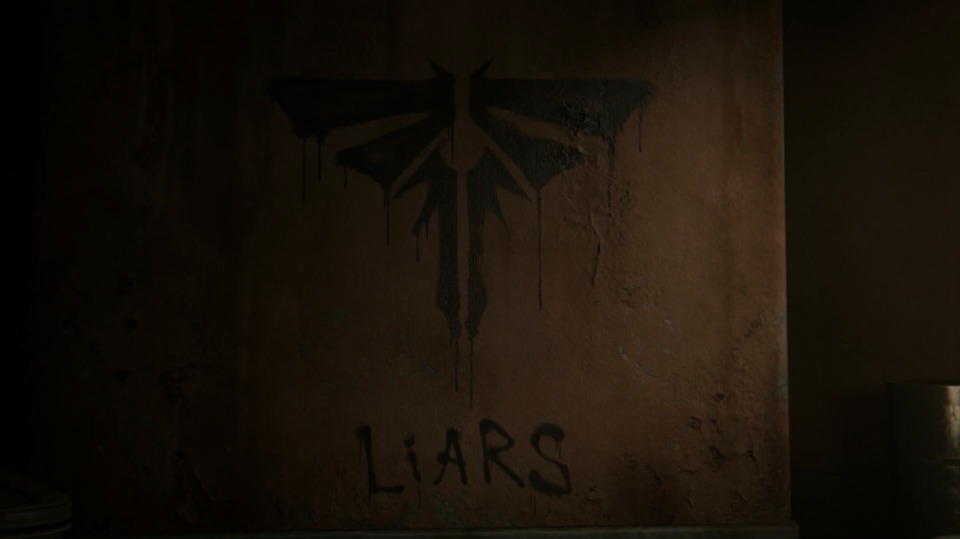
The above image is pulled from one of Ellie’s flashbacks, her birthday. Ominous and haunting, foreshadowing the heartbreaking truth she will inevitably have to learn, this bloody painting of a betrayed Firefly punctuates the happy adventure Joel had just taken her on.
“Liar.”
A word which repeats itself throughout the entirety of The Last of Us Part II. A concept which, I believe, is the purest distillation of a game that exists entirely as a response to its predecessor's famed finale:
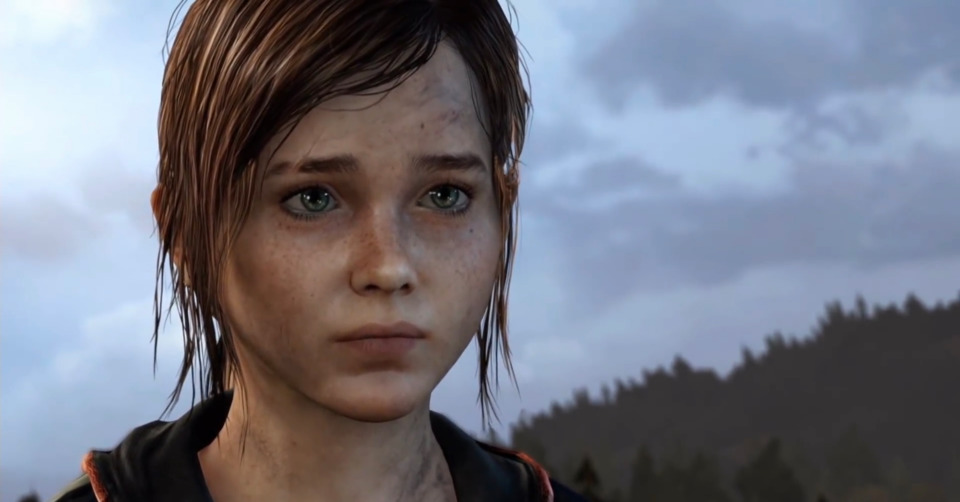
A straight-faced lie told to a scared girl. In The Last of Us, the foundation upon which Ellie is built is that of her immunity. It gives her purpose; and then that purpose is stripped from her and she has nothing left to offer the world. Now, in Part II, we find her trying to build herself upon a new foundation; but that foundation is built on a lie, it’s weak, and it will eventually crumble. And while there are many, many things propelling Part II’s story forward, the inevitability of Ellie discovering the truth lends a sort of nervous energy to the game. Eventually, you think, she will learn what actually happened, and she will begin to question, and perhaps even stop, her bloody crusade for a man who sacrificed the world for her—one little (in her eyes) insignificant girl. Only, that’s not what happens.
She discovered and confronted Joel about the truth years before the game started, and it’s as a flashback, displaced and detached from the visceral violence of the main narrative, that you watch this occur. And then, as if the lie never really mattered, the game thrusts you back to bloody Seattle. Back to the same old violence. To an Ellie who hates Joel, who wants nothing to do with him, and yet, one who seeks revenge. Why, I wondered? Why go through such lengths to avenge a man who not only betrayed her, but destroyed the very world as well? For love, you say, and that’s part of the equation, sure; but then, if love was Ellie’s true motivation, why would she abandon her pregnant girlfriend in order to get to Abby? And why would she later go on to leave her and their infant son alone for revenge?
Dina herself makes these exact points when she tells Ellie, “[Abby] doesn’t get to be more important than us.” She makes these exact points when she asks Ellie to “prove” her love by staying instead of going after Abby.
And yet, despite Ellie’s “love,” she leaves; because love isn’t the reason Ellie does what she does. And until I saw the other flashbacks between Joel and her, I didn’t realize how I’d been asking the wrong questions to begin with; because it isn’t the why of everything that concerns Ellie. She knows why Joel saved her and lied to her; and she knows why Abby tortured and killed him. What she doesn’t know is how.
How could Joel damn the world? How could Joel have lied to her? How could Abby have been so cruel (a question which repeats itself throughout as Dina asks about Tommy's past and all the horrible things he and Joel have done to people)? How can she ever, like Dina, just let it all go? And, most importantly, how could she ever forgive?
It’s in search of those answers that ultimately propels Ellie forward. For yes, there is still the inescapable rage and pain of watching the man she loved die. But when she starts her journey, she understands all the whys; but none of the hows. She is just a kid, after all. She has yet to learn any of them. And if you were to track Ellie’s journey, those are the lessons you would find for a girl whose entire persona was built on a lie. A persona now being dismantled by the truth, a truth doing all of this during a time in her life when she is already, like every teenager, feeling self-conscious and out-of-place and lost. By the beginning of her horrible crusade, all that Ellie knows about herself is the rage and the pain, because, as we find out in her final flashback with Joel, she never got the chance to learn how to forgive and how to let go.
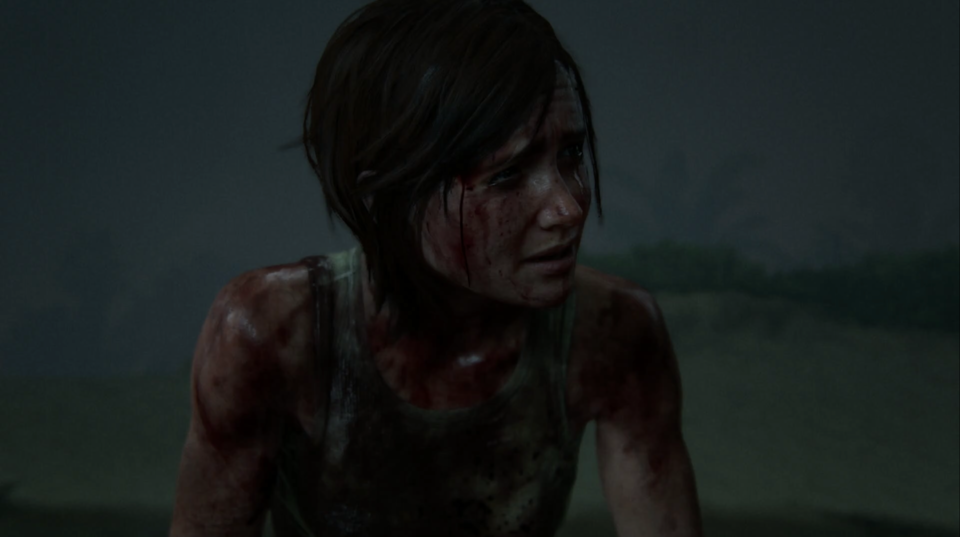
In what I would call “The Epilogue” of Part II, Ellie finally has Abby near death. She is choking her beneath the waves; and yet, a flash of Joel prompts her to let go. In these brief seconds is encapsulated the exact reason why Part II exists: how Ellie can go from a revenge seeking monster to a penitent human.
Joel.
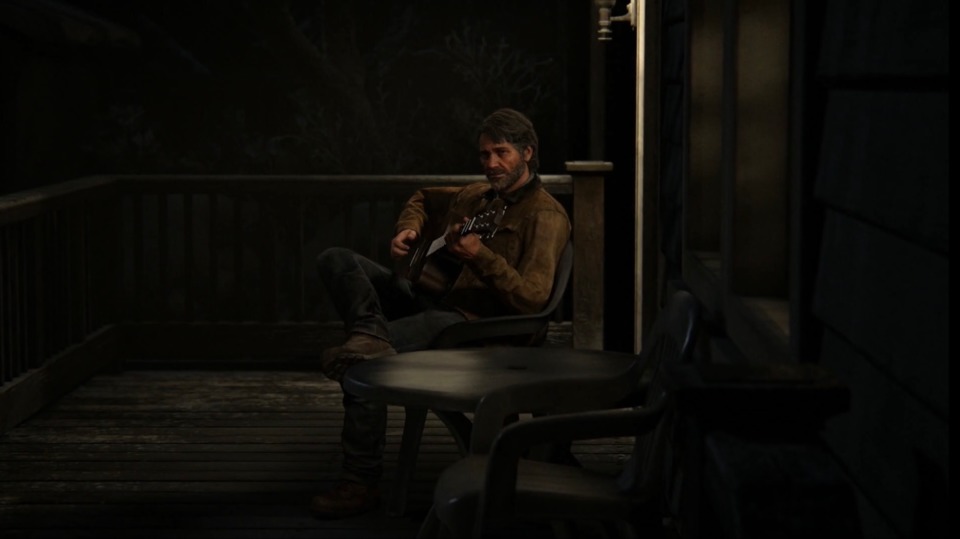
In Part II, the first proper scene between the pair of them is one in which Joel promises to finally teach Ellie how to play guitar. How to strum the notes on that instrument and turn off-key, awkward sounds into beautiful music.
He sings for her: "If I ever were to lose you, I'd surely lose myself." A rather obvious message, but Joel isn't a poet. He’s a weary old man—a father—one who has long learned the lessons Ellie hasn't. And though she may hate him for doing what he did, and for having lied to her about it, she is eventually willing to try to forgive him.
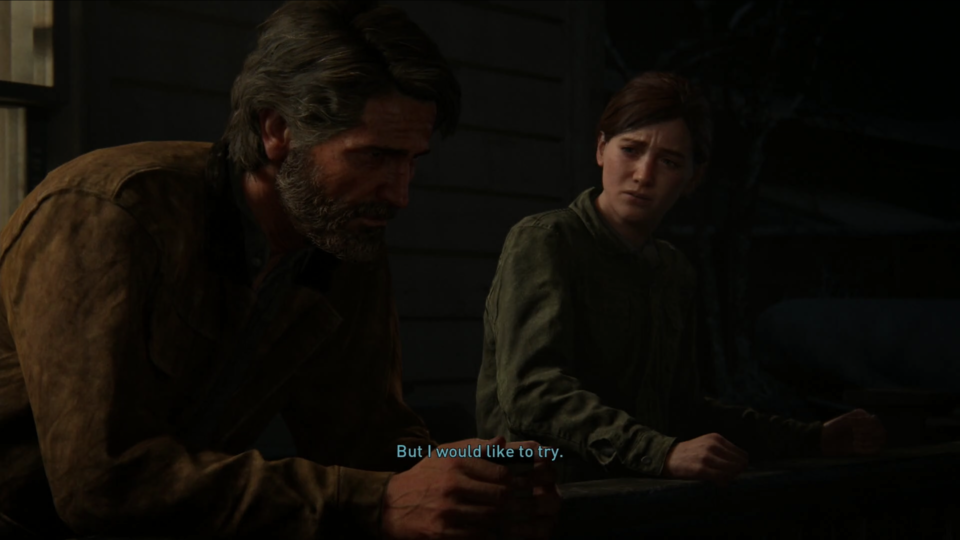
It’s the saddest scene in the entire game, I believe. Paralleled only by Dina helplessly begging for Ellie to stay. Because, coming poignantly at the end, it finally explains the very core of Ellie’s pain: the immense guilt and regret of never getting the chance to try to forgive Joel. She wanted him to be her father again. But Abby took that away from her. And not only that, but she had to watch as this man she loved—this man who had always managed to somehow get back up for her, his daughter—was finally bludgeoned to death in the cold ruins of a dilapidated mansion.
Throughout the game, Ellie is mourning the loss of an unfulfilled promise.
Of the what-if she’d bury in the camp cemetery.
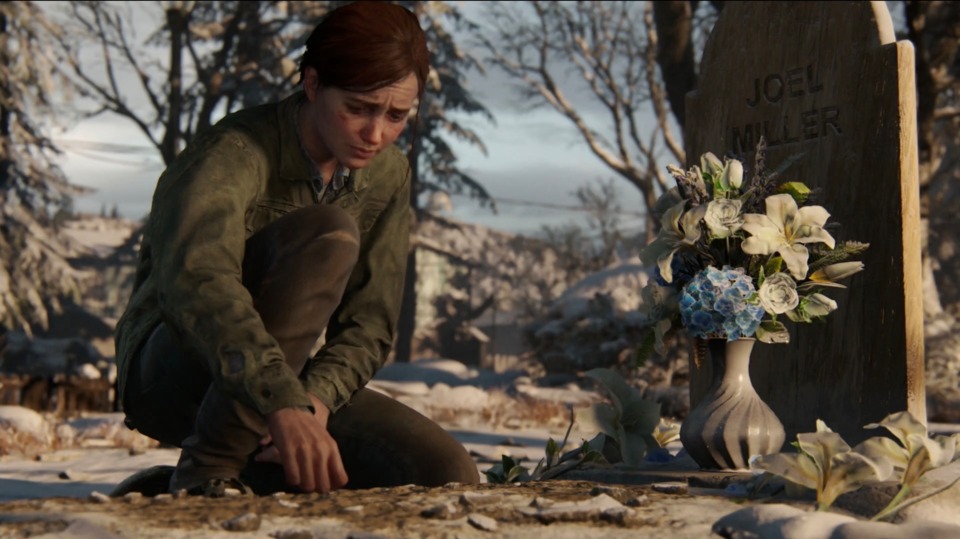
In writing this article, I remembered how, during key moments in her life, Ellie has had little to no control over what happened to her. Riley’s death. Sam’s death. Tess’s death. Eventually Joel’s death. David and the cannibals kidnapping her in Part I. Her very immunity even took control of and dictated her life. And, most importantly of all, her surgery. She was entirely absent for a very pinnacle moment in her life. Everyone but her had a say as to how things happened. Everyone but her justified her death.
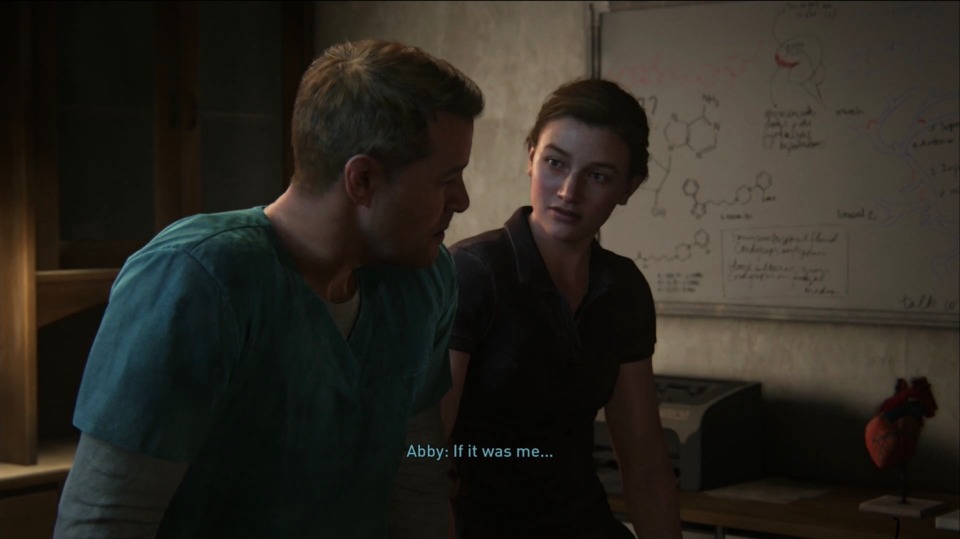
“If it were [her],” Abby says to her father. But it wasn’t. It was Ellie. And before anyone stops to ask if she is willing to die for the cure, they go ahead and do it.
Or they try to anyway.
Just before the scalpel enters her body, Joel barges in to save Ellie, killing the doctors and killing every chance she has of ever having the option of doing this again.
But what if he hadn’t?
How many innocent people would still be alive if Ellie had cured them?
It’s a question that haunts her.
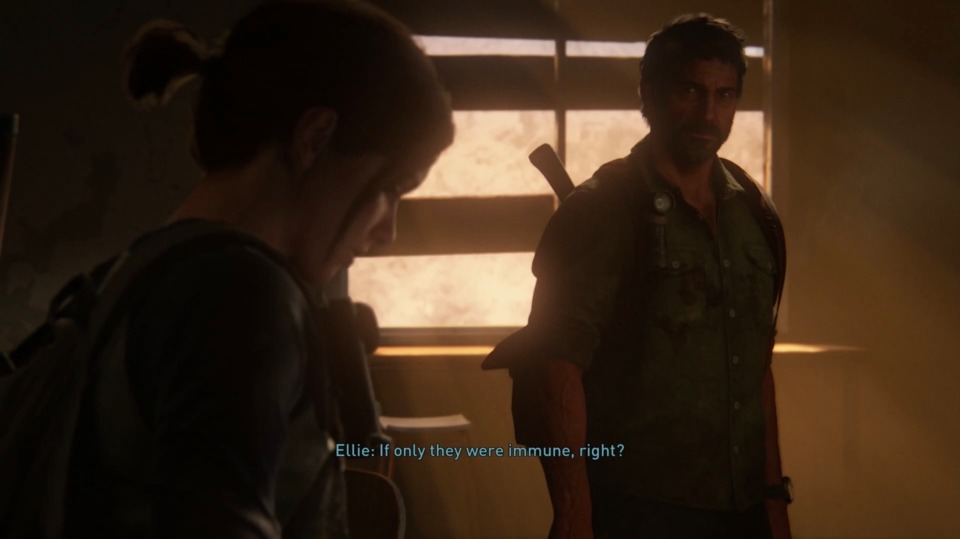
It’s when she discovers the truth from Joel that she strives to take her life into her own hands—that she attempts to never again be helpless and without control over her own life. It’s what her “we’re done” really means.
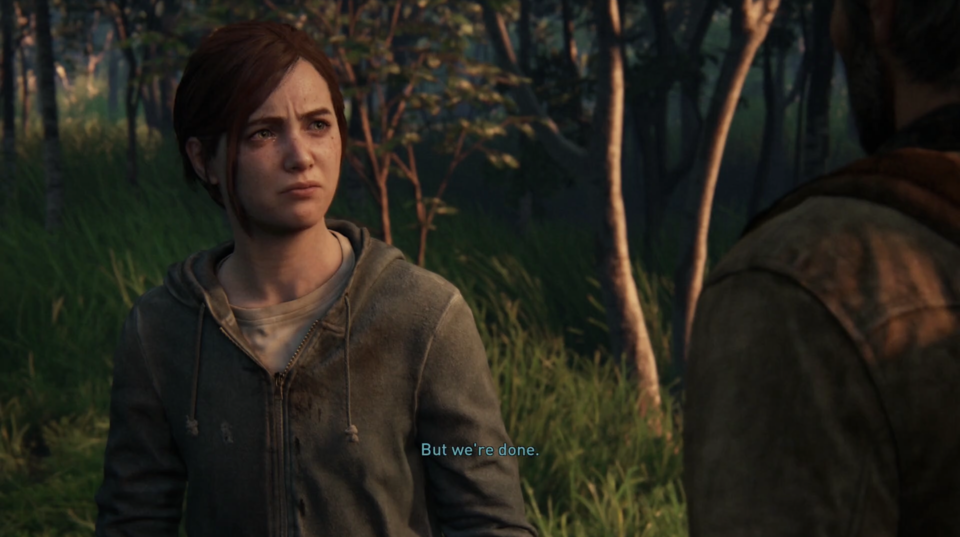
Joel did more than lie and betray, he took her autonomy away. And now she wants it back. It’s why she set the terms of their conversation before she tells him “we’re done.” "If you lie to me one more time, I’m gone,” she says. “But if you tell me the truth, I'll go back to Jackson." However this conversation ends up going, she controls it. And later, when they’re back at camp, she avoids him or confronts him when he tries to protect her. “I had Seth under control,” she says. She can handle herself. She even tells him to stop controlling Jesse’s raids; because, by extension, Joel is controlling her raids. Ellie is, as with every teenager, seeking to be her own person, and she sees Joel as an obstacle to that.
But for all her want of control, she ends up watching Joel die.
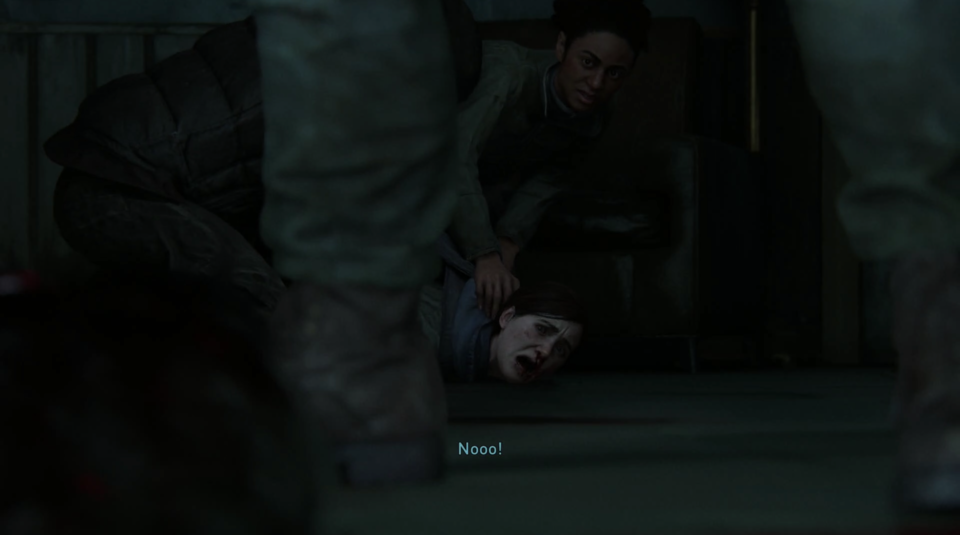
The propeller for Ellie’s revenge is more than just her rage. It’s more than the fact that her father figure was tortured and murdered. It was that she had to watch him be murdered, helpless, as she has been throughout all of her life. Once again, in the most brutal way possible, with yet another person she cares about, her control was taken from her.
And it’s those relationships, along with new ones she loses throughout Part II, which reinforce her fear of helplessness. Constantly throughout this game, Ellie’s friends try to help her. And they do, but not without her making sure that it is of their own volition. She makes sure that they’re always “good.” That she isn’t inadvertently forcing them to help her or otherwise hurting them in any way. Before accepting Dina’s assistance, for instance, Ellie says she doesn’t want her to feel like she “has” to. It has to be Dina’s choice. But when Ellie learns that Dina is pregnant, it presents a burden on her, because now someone who can’t answer for themselves is a part of this equation: an unborn child.
Ellie can’t be responsible for another person’s death. Nor can she be helpless to watch them die. Even when Abby has her gun pointed at Tommy’s head, or her knife against Dina’s throat, Ellie tries to reason with her:
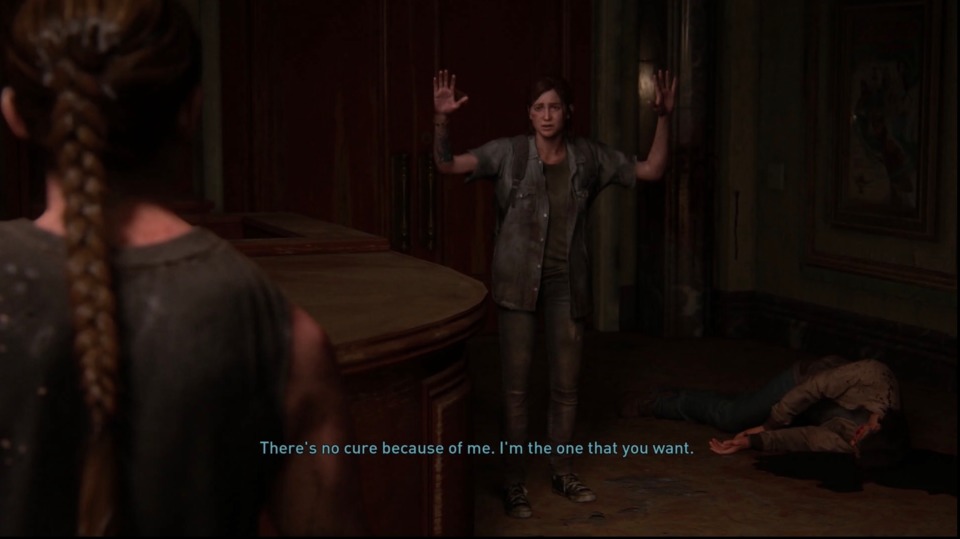
Abby, of course, sees the horrible irony in Ellie’s plea; and although Ellie can’t quite see it herself yet, Abby realizes the willful ignorance and blind rage that underscores Ellie’s actions. Ellie may not want to be responsible for her friends’ deaths, but she made them a part of this. She is the reason they are all there to begin with; and she is the reason her whole world will eventually come undone. And like any tantruming child unwilling to accept responsibility for their actions, Ellie, during her final confrontation with Abby, threatens Lev with the same death Abby almost gave Dina:

This action of manipulating the truth to protect herself is a pattern which repeats a number of times throughout the game. For instance, when Jesse wants to go after Tommy at the Marina instead of Abby at the Aquarium, Ellie tries to convince him the best course of action is doing the latter when she knows it’s really the former. Later, when Ellie is about to leave Dina and her son for another shot at revenge, she tells Dina that it was “up to [her]” if she was there when Ellie returns. As if to say that’d it’d be Dina’s fault, not hers.
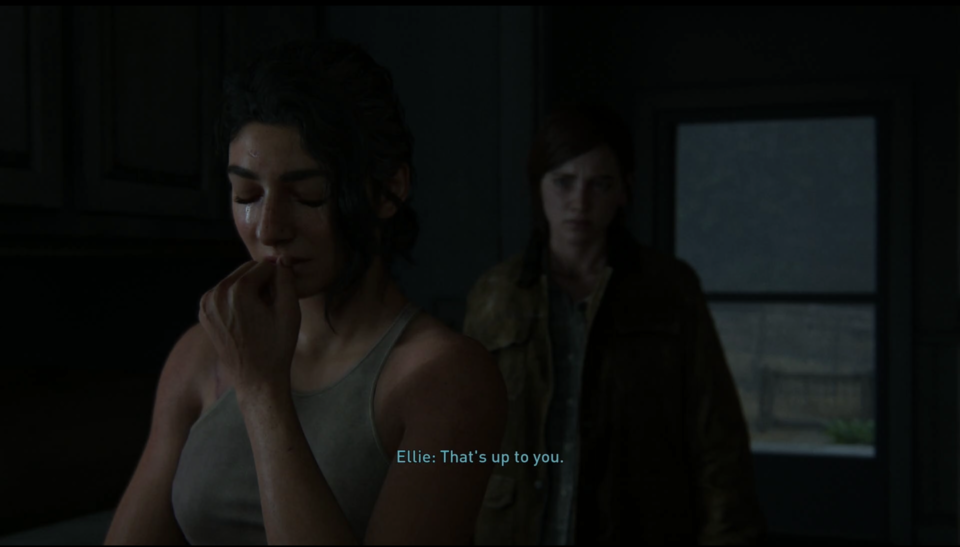
Ellie is fabricating lies in order to justify her behavior, because that behavior is all she has now. It keeps her up at night. It keeps her from eating. The violence and the anger has become a part of her now, filling that void left behind by the immunity that propelled her through the first game. The lies she tells to get her hands around Abby’s neck, rebuild the foundation that Joel wrecked when he told her the truth. She believes she “needs” to go after Abby in order to soothe the pain inside of her.
But it’s not revenge she needs—it’s closure to that unfulfilled promise she made to Joel. And when she finally has her chance at revenge, she lets go. Because now, after everything she’s been through, Ellie understands exactly how Abby could do what she did to Joel, and how Joel could kill everyone in that hospital long ago in order to save her. Compared to someone you love, the rest of the world doesn’t matter; and by the time she has finally gotten her hands around Abby’s neck, Ellie herself has thrown an entire world away—her friends, her family, her lover and her child—and done things that keep her up at night, for just one weary old man who taught her how to play guitar.
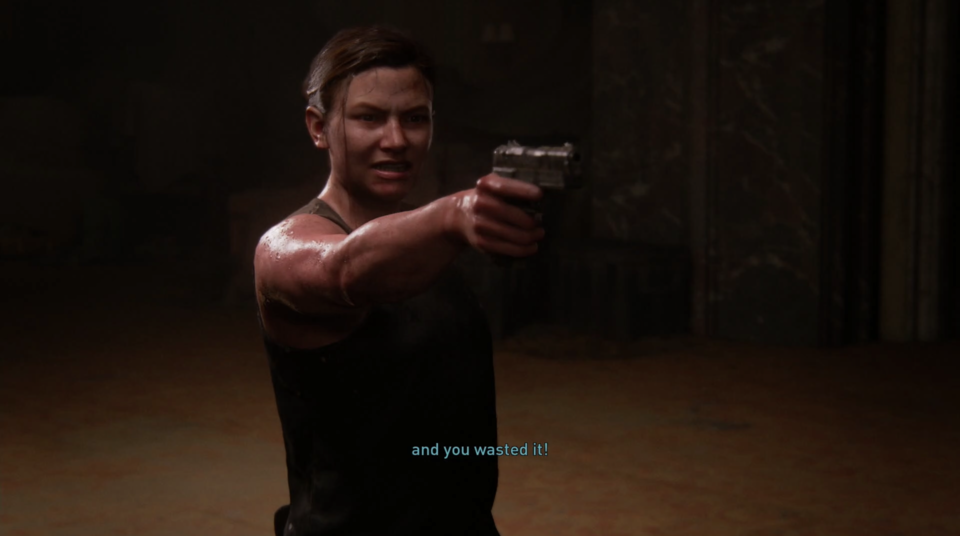
I would be remiss not to mention Abby’s role in Ellie’s journey and the game at large. If Ellie’s story chronicles her understanding of how someone could kill and torture and damn an entire world for the love they feel; Abby’s is in learning how anyone could fight for someone other than themselves. She follows a similar path that Joel does in Part I. She begins having lost her father, and lets the tragedy of that loss control her; but by the end of the game, she is a far more humbled person, filled with humility, dignity, and kindness. It’s a switch that begins with Lev, a boy who presents the same opportunity for Abby that Ellie did for Joel: an opportunity to love again.
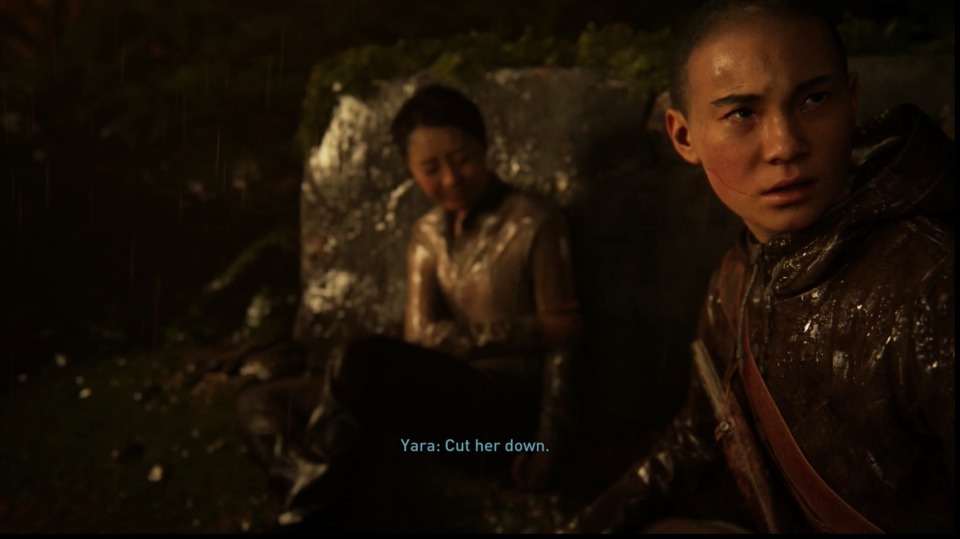
Going back to Abby’s "you wasted it" scene, I don’t think a younger Abby would’ve said what she did and done what she done here. In the heat of the moment, I questioned her. After all, Abby went on the same crusade as Ellie. They are here because of that crusade. And yet, she thinks she can judge Ellie? But then I took a breath, and I saw this:
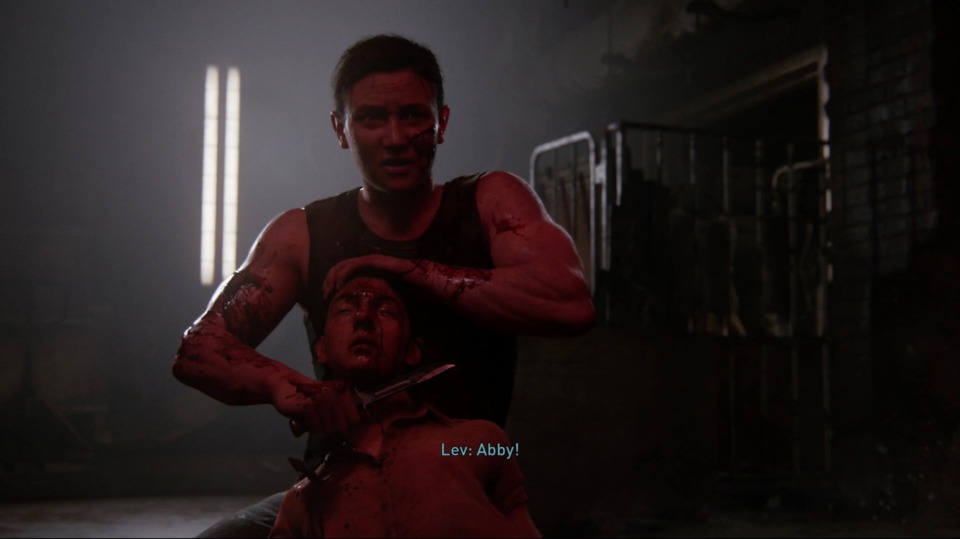
Had she been the same girl she’d been at the very beginning of the game, Abby would’ve slit Dina’s throat, hobbled over to a sobbing Ellie and beaten the poor girl to death with the butt end of her blade without hesitation.
Instead, Lev tells her no.
And she walks away.
Even her warning (“Don’t ever let me see you again.”) was feigned:
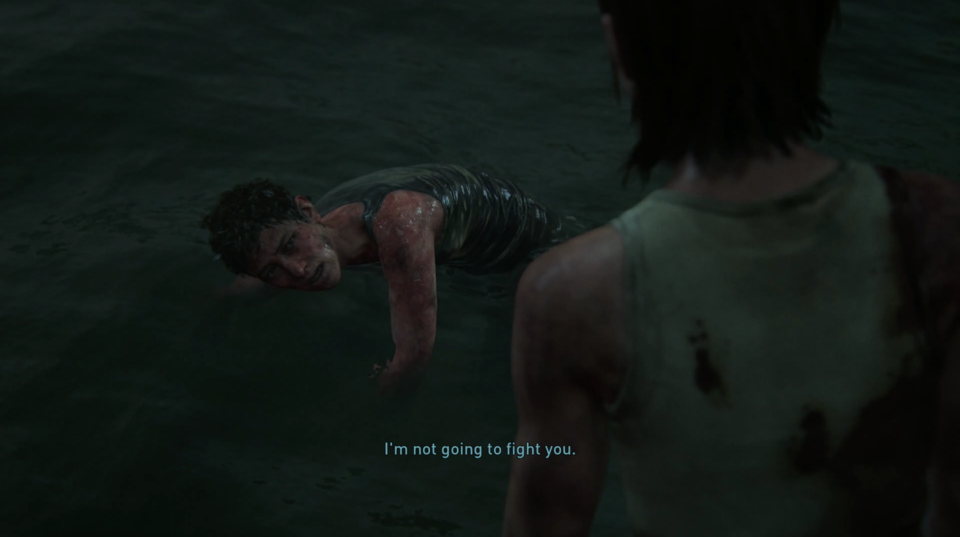
It’s only when Ellie threatens Lev’s life—someone Abby loves, someone other than herself, someone kind and pure—that Abby fights. Because, like Joel’s, Abby’s journey is one of pain sutured with love. When Abby says “you wasted [your life]” she does so because now, after what she’s been through, she understands the value of life. A girl before Lev and a girl before Joel, wouldn’t have said that.
There is a very poignant and powerful moment that occurs between Abby and her lover, Owen, that I think captures and sums up not only this point, but the whole story at large:
Abby: Sorry I grew up. You should try it.
Owen: Oh yeah? How do I do that, Abby? Do I find the people who killed my parents? Cut into ’em? I can torture them until they’re crying in their own—
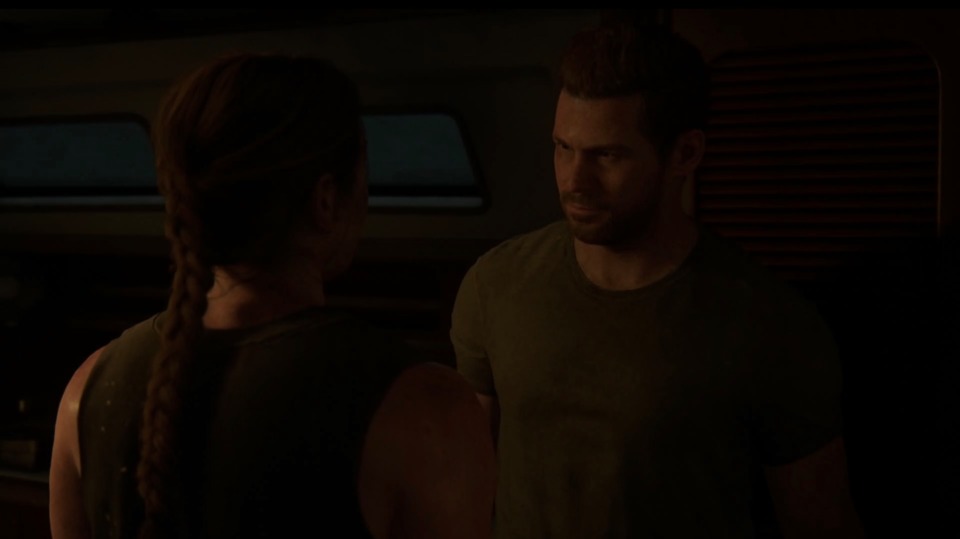
Owen's damnation of Abby’s actions stresses the game’s coming-of-age storyline. Though Part II is a very “mature” post-apocalyptic fiction, it is, at its core, the story of two girl’s maturation; and to view it as anything else would not only be reductive, but fail to do the narrative justice. For, as with all well-written post-apocalyptic fiction, it is not in the violence and horror that the game concerns itself, but in Ellie and Abby’s self-realization. In the questioning of such violence, and in the understanding of where that blood and gore and rage and pain sits in a person's heart—and in where exactly its place in society is.
The two girls spend the game navigating these waters. For Abby, it comes in the form of her friends questioning and regretting what they did to Joel until, finally, her guilty conscious pushes her to try to wash away the blood on her hands. For Ellie, it’s her struggle to understand how she is supposed to live her life now that Joel is gone and her immunity means nothing.
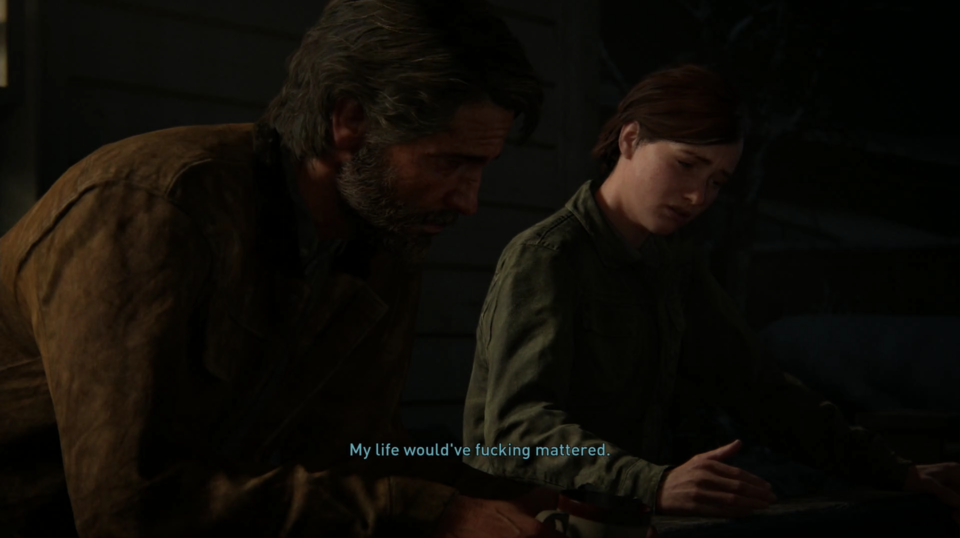
“My life would’ve fucking mattered,” she says. It’s a sentiment which haunts not only Ellie, but Abby as well. Because, as soon as Joel pulled his trigger and stole Ellie away, Abby’s father died for nothing. No cure ever was—nor ever would—be made. And now, all Abby has is revenge. And when she gets it, all Ellie is left with is that same vengeance, the very purpose of which is to give some semblance of meaning to a person’s unlawful death. Only, there is no meaning to it all. The vengeance only serves to hurt those you love; not bring justice. Both Ellie and Abby learn the hard way how revenge doesn’t make you a hero, and that their senseless violence only serves to add bodies to a growing and seemingly endless pile of corpses.
Like its characters, the medium in which The Last of Us Part II lives is maturing. It has been for some time, and as video games become more mainstream, more popular, and more varied, they begin to take on the same thematic depth as all other forms of entertainment have. And with that maturity comes not only the exciting possibilities of growth and the pleasure of those more thought provoking narratives, but the unexpected, the surprising, the uncomfortable and the stories that not only challenge our understanding of life, but make us question our beloved characters just as we often question ourselves in real life.
Below is a soft, intimate scene between Dina and Ellie. They dance. And all the boys, Ellie remarks, are looking at Dina. Because, Ellie says, she’s nothing to be jealous about. She’s not a “threat.” But Dina thinks differently: “They should be terrified of you.” Because Dina knows the strength and tenacity inside of a girl who could make the world hers if given the room to grow and the confidence to be herself. She could make beautiful music, if, as Joel says once, “[she] builds up those calluses.” And she does. And she grows. But in so doing lets her rage and her pain take control. And the haunting scene we’re left with in the end, is of her sitting in Dina and her’s now abandoned home trying to strum “If I ever were to lose you” on Joel’s guitar, only to fail because of the fingers she lost trying to choke Abby before finally letting go...
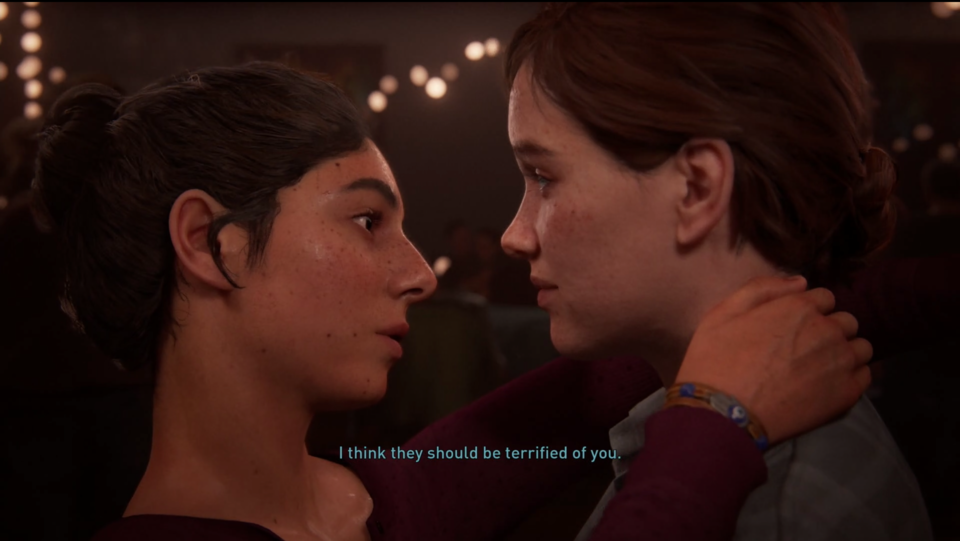
The Last of Us Part II is not a flawless experience. As beautiful as its characters are, they are trapped in a narrative too long, with messy plotting, and in a game whose mechanics are simply a means-to-an-end. But despite those faults, The Last of Us Part II manages to elucidate not only the nature of humanity, but also how we, as young adults, may build our lives, our personalities, our ideologies and philosophies on lies that, in adulthood, come crumbling down with the questions maturity brings; and how, in the end, it isn’t about what the world wants or needs, it’s about how you, as your own individual person, choose to live inside of it.
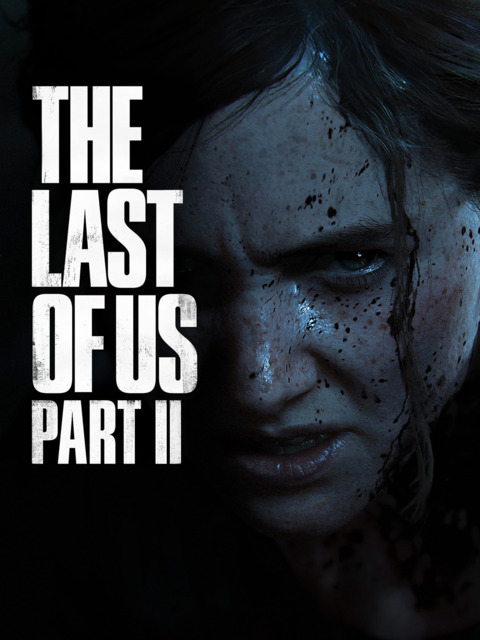
Log in to comment